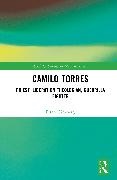Read more
List of contents
ContentsAcknowledgmentsList of MapsList of IllustrationsIntroduction An Unforgettable Evening
Goals of the Book
Structure
For whom is this book intended?
Chapter 1: Colombia: Basic Information and Fundamental Problems General Historical Aspects
The Political and Economic System
"
El Bogotazo" of 1948 and the "Outbreak of Violence" (
La Violencia)
The Lessons of the "Independent Republic"
The Culture of Violence - Colombian Style
Chapter 2: The Global Catholic Church and the Catholic Church in Colombia The Catholic Church and Modernity
The Church in Colombia
The Colombian Church and the Question of Social Welfare
Chapter 3: Camilo Torres: Biographical Aspects Childhood and Adolescence
The Belgian Period: Studies in the Shadow of an Era of Crisis
A Religious and Professional Career
Tests of Torres's Approach
Chapter 4: The Crystallization of Camilist Theopolitics Torres's Social-Theological Rationale
Rebellion is Inevitable: Why must Christians be revolutionaries?
On the Necessity of Structural Reform: Camilist Thinking
The Omission of Jewish Tradition from Camillist Thinking
One Step before a Theopolitics of Liberation
Chapter 5: The United Front of the People (Frente Unido del Pueblo) as a Third Center of Power The Platform of the Movement
The Crucial Day
The 12 Messages
Evaluating the Messages
The Disagreement with the Church and Torres's Defrocking
Delegitimization and Character Assassination: The Day after the Defrocking
Chapter 6: The Failure of the Movement's Campaign A Final Effort: The Meeting at the Bavarian Brewery
Between Optimism and Pessimism
The Final Message from the Mountains
The Reasons for Failure
Chapter 7: Joining the Guerrillas A Moment of Truth and Isolation
Torres and the National Liberation Army (ELN)
"A Prophet is not without honor except in his own town and his own home."
Chapter 8: The Camilist Legacy New Social Perspectives
A New Species of Apostolism
The Medellín Conference
Chapter 9: Torres: The Catholics' Che Guevara? Similarities:
Biography The Tendency to Theorize Reality
The Symmetry of the Failure and of the Hope for a Heroic Return
Che Guevara and Camilo Torres: Theologians of Liberation
Differences
A Che Guevara of the Catholics alone?
Epilogue A Return to the Unforgettable Night
A Final Look
Camilo Lives!
BibliographyIndex
About the author
Eitan Ginzberg is a retired associate professor of history and culture at the Kibbutzim College of Education in Israel, a senior lecturer at Achva Academic College, and a Research fellow at the Sverdlin Institute of Latin American History and Culture at Tel Aviv University. His research focuses on the history and culture of Mexico and Latin America, as well as the study of genocide. Dr. Ginzberg is the author of numerous articles and several books, including
Lázaro Cárdenas, gobernador de Michoacán (1928-1932) (1999);
Revolutionary Ideology and Political Destiny in Mexico, 1928-1934: Lázaro Cárdenas and Adalberto Tejeda (2015);
The Destruction of the Indigenous Peoples of Spanish America: A Genocidal Encounter (2018).

